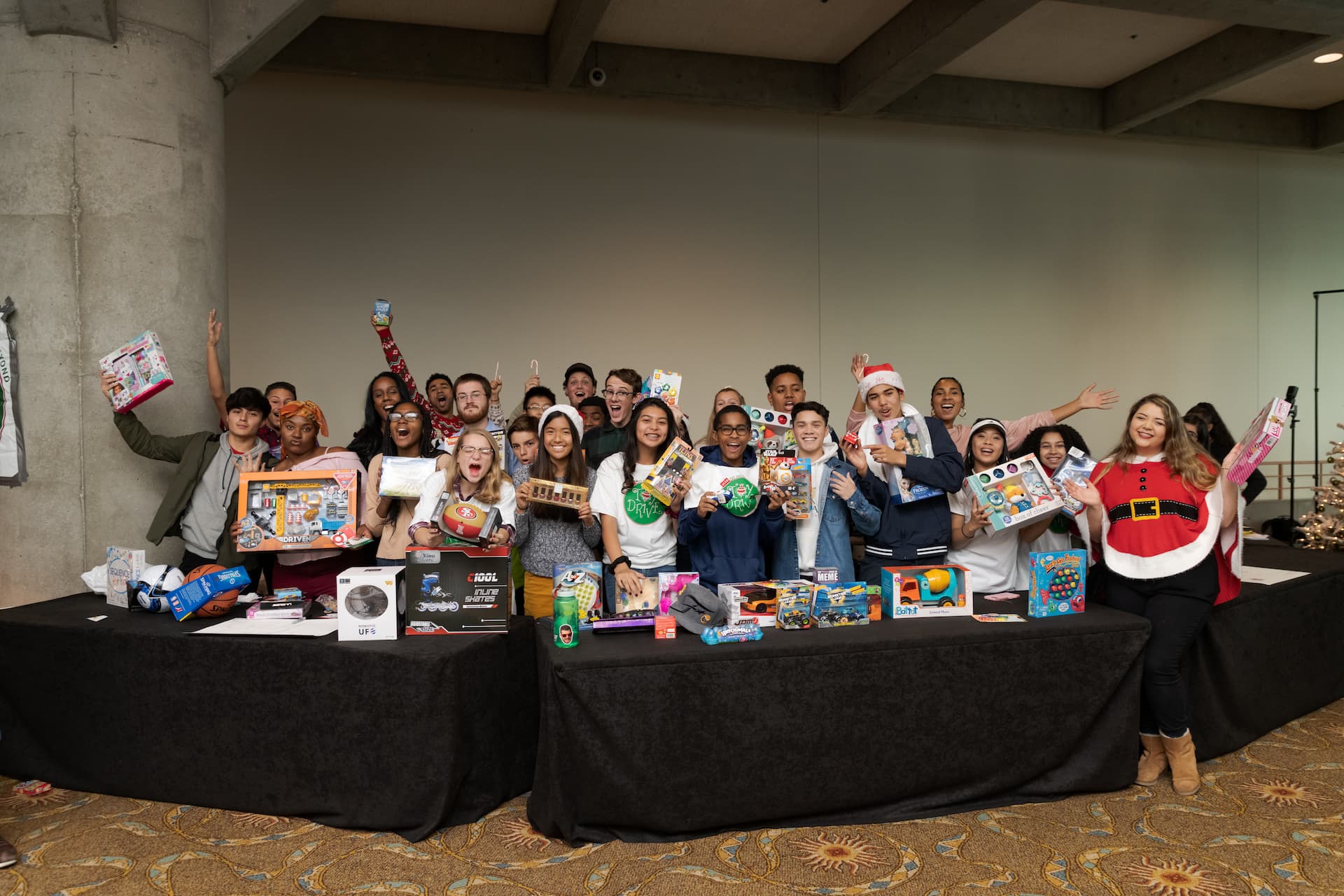Sign up for The Good Stuff
Our weekly newsletter filled with news, updates, and inspiring stories of how God is working in the Bay Area.
"*" indicates required fields
Sign up for The Good Stuff
Our weekly newsletter filled with news, updates, and inspiring stories of how God is working in the Bay Area.
"*" indicates required fields
We’d like to take this opportunity to express our gratitude to all the camp counselors who volunteered to serve our middle schoolers and teenagers! The 2023 Y-Ministry Camps were a huge success thanks to your faith, love, and efforts to serve and give.
You generously took time off work to help middle schoolers and teenagers develop their faith in God. You had conversations with them that helped them navigate the impact of the pandemic, social media, and the challenges of adolescence on their emotional and spiritual health.
You spent sleepless nights in cabins and long afternoons playing and running with kids who have boundless energy, all while knowing you have your own life responsibilities waiting for you at home.
Let us not grow weary or become discouraged in doing good, for at the proper time we will reap, if we do not give in.
Galatians 6:9 AMP
Knowing all this, we put together an easy-to-follow guide to assist you in recovering after dedicating a lot of effort towards supporting the next generation. We all face the temptation to become weary or discouraged in doing good, especially after we have given out a lot, so we want to do our part to help you stay strong.
For those of you reading this who were not at camp, we hope these passages help you during times in your life when you feel exhausted after periods of sustained effort.
And if you’re a parent whose teen or middle schooler went to camp, please take note of these verses because your kids are probably tired too! The emotional and spiritual work of vulnerability, learning, and building new relationships can take a lot of energy. Teaching our kids to recognize their spiritual and emotional fatigue will help them (and their parents) greatly in the long run.
Let’s get at it.
1. Pinpoint areas of exhaustion
After periods of exertion, we often mistakenly think that physical fatigue is the only type of fatigue we experience, but emotional and spiritual fatigue can be just as debilitating. Our 20+ years of experience running camps has taught us that recovering from a week of sustained effort like this requires more than just physical rest and sleep.
In the days following camp, spiritual and emotional fatigue tend to manifest themselves in ways that aren’t obvious, such as:
- Avoiding our emotions by keeping ourselves distracted.
- Feeling swamped by all the things that need to be done.
- Disappointment that is unexpected and leads to a lack of motivation.
Camp is an amazing opportunity to connect with God and friends, free from the distractions of everyday life. However, our problems didn’t go away while we were in the Santa Cruz mountains. The challenges we faced before will be waiting for us upon our return, and we’ll need to be sure we’re equipped to face them.
Turn my eyes away from vanity [all those worldly, meaningless things that distract-let Your priorities be mine], And restore me [with renewed energy] in Your ways.
Psalm 119:37 AMP
Before we get back to our day-to-day life, we can restore our spiritual energy by taking time to reflect on these questions:
- How is my faith coming out of camp?
- How was my faith going into camp?
- What areas of my life are affecting my faith this week? What do I want to avoid? What is burdening me?
- What is one area of my relationship with God that I can work on this week?
Once we’ve identified the areas that are contributing to our fatigue, we can begin taking action to recover.
2. Express needs in prayer
Expressing the needs we see is the second step on the road to rejuvenation
Yet the news about him spread all the more, so that crowds of people came to hear him and to be healed of their sicknesses. But Jesus often withdrew to lonely places and prayed. One day Jesus was teaching, and Pharisees and teachers of the law were sitting there. They had come from every village of Galilee and from Judea and Jerusalem. And the power of the Lord was with Jesus to heal the sick.
Luke 5:15-17 NIV
Luke 5 teaches how Jesus relied on prayer to recover from days of serving. Even the Son of God took time to pray before he resumed his daily work of teaching and healing.
In Luke 11, another helpful passage about prayer, Jesus taught us to pray about the things that matter to us most—our gratitude, our needs, our guilt, and our relationships. When we bring these things to God, it brings us closer to him and refreshes us in the process.
3. Nourish our faith with scriptures
The Bible builds our faith (Romans 10:17), and after periods of sustained exertion, we need quality time in the Word. One especially helpful story to read is that of Elijah in 1 Kings 19; it’s all about the feeling of reaching great spiritual heights only to come down to the reality of difficulty.
Elijah was afraid. So he ran for his life. He came to Beersheba in Judah. He left his servant there. Then he traveled for one day into the desert. He came to a small bush. He sat down under it. He prayed that he would die. “LORD, I’ve had enough,” he said. “Take my life. I’m no better than my people of long ago.”
1 Kings 19:3-4 NIrV
Elijah felt extremely exhausted and discouraged right after his two great spiritual triumphs: the defeat of the prophets of Baal and the answered prayer for rain (1 Kings 18). Discouragement often sets in after great spiritual experiences, especially those that require physical exertion or involve strong emotions. Just like Elijah, we may feel like we’re on top of the world after a great camp experience, but then lose our confidence when we come home and face the challenges of everyday life.
The LORD said, “Go out. Stand on the mountain in front of me. I am going to pass by.” As the LORD approached, a very powerful wind tore the mountains apart. It broke up the rocks. But the LORD wasn’t in the wind. After the wind there was an earthquake. But the LORD wasn’t in the earthquake.
After the earthquake a fire came. But the LORD wasn’t in the fire. And after the fire there was only a gentle whisper. When Elijah heard it, he pulled his coat over his face. He went out and stood at the entrance to the cave. Then a voice said to him, “Elijah, what are you doing here?”
1 Kings 19:11-13 NIrV
Elijah’s exhaustion led him to isolation. He had to get to a spot where he could hear God’s “gentle whisper” in order for him to recover. Elijah’s story reminds us that we can overcome anything through our relationship with God.
We recommend taking some time to go through this devotional series about Elijah on Deep Spirituality. The series is broken up into eight short parts. You can read it all at once or spread it out over several days. The pace is up to you. Take your time and reflect on Elijah’s story as you go.
4. Make meaningful connections
One of the commands God gave to Elijah in that “gentle whisper” was to anoint Elisha to replace him as a prophet of God:
The LORD said to him, “Go back the way you came, and go to the Desert of Damascus. When you get there, anoint Hazael king over Aram. Also, anoint Jehu son of Nimshi king over Israel, and anoint Elisha son of Shaphat from Abel Meholah to succeed you as prophet. Jehu will put to death any who escape the sword of Hazael, and Elisha will put to death any who escape the sword of Jehu. Yet I reserve seven thousand in Israel-all whose knees have not bowed down to Baal and whose mouths have not kissed him.”
1 Kings 19:15-18 NIV
It is significant that God sent Elijah to the man who would become a fiercely loyal student and close friend. God knows that when we are weak, we need friends to help us keep going.
One of the most encouraging things about being at camp is the friendships; campers and counselors alike build new friendships and strengthen old ones. Spending time with friends after camp—talking about memories, making new ones, and bonding on the journey of growing together—is equally important to our faith.
And let us consider how we may spur one another on toward love and good deeds, not giving up meeting together, as some are in the habit of doing, but encouraging one another—and all the more as you see the Day approaching.
Hebrews 10:24-25 NIV
Maintaining strong relationships after camp is one of the best ways to keep our faith and excitement alive. Prioritizing times to meet together this week to connect and encourage each other with scriptures will be essential to ensuring that our faith remains strong.
As we move into the summer, let’s take advantage of every opportunity to motivate each other to do more good deeds, build new memories, and change lives along the way.
Enjoy your downtime, and thank you for your willingness to serve!

Written by
Bay Area Christian Church
This was created by a member of the Bay Area Christian Church team.
- |
Here are some meaningful ways you can join our church in making a difference around the Bay Area this holiday season.
Having Trouble with giving through the PayPal Giving Fund? Here are some simple fixes you can try.


